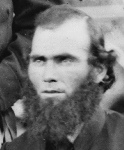 Open main menu
Open main menu
 Open main menu
Open main menu

W. Corby
(1833 - 1897)
Home State: Indiana
Branch of Service: Infantry
Unit: 88th New York Infantry
Before Antietam
He enrolled at Notre Dame University in Indiana in 1853 and was ordained a Catholic priest. Before the War he was a member of the Congregation of the Holy Cross at the University of Notre Dame. At the request of Reverend Edouard Sorin, Notre Dame's founder, Corby volunteered for service with the 88th New York Infantry, joining the regiment outside Washington DC in December 1861. Age 30, he mustered as Chaplain on 15 December 1861,
On the Campaign
He was with the famed Irish Brigade as they prepared to charge on the Sunken Road position on September 17th:
Our brigade received orders to go in "double quick," that is, on a full run. I gave rein to my horse and let him go at full gallop till I reached the front of the brigade, and, passing along the line, told the men to make an Act of Contrition. As they were coming toward me, "double quick," I had time only to wheel my horse for an instant toward them and gave my poor men a hasty absolution, and rode on with Gen. Meagher into the battle. In twenty or thirty minutes after this absolution, 506 of these very men lay on the field, either dead or seriously wounded ...
I shall never forget how wicked the whiz of the enemy's bullets seemed as we advanced into that battle. As soon as my men began to fall, I dismounted and began to hear their confessions on the spot. It was then I felt the danger even more than when dashing into battle. Every instant bullets whizzed past my head, any one of which, if it had struck me, would have been sufficient to leave me dead on the spot, with many of my brave soldiers, as the bullets came from the Confederates at very close range.
All the wounded of our brigade, numbering hundreds, were carried to a large straw-stack, which had to answer for a hospital ... Here I saw one poor man with a bullet in his forehead, and his brains protruding from the hole made by the ball. Strange to say, he lived three days, but was speechless and deaf, and had lost his senses entirely. I attended another, a well-built man, in the full vigor of manhood, and about thirty years of age. A ball had passed directly through his body. He lived but two days, and died in great agony.
McClellan defeated the Confederates, who sustained a terrible loss, and then marched on and took possession of Harper's Ferry. I remained behind several days with the wounded. The next day after the battle I had a small hut erected near the straw-stack, celebrated Mass, and gave Holy Communion to all who were prepared. In doing so, I was obliged to carry it to them, as they lay here and there on the straw, unable to move - stepping over some, and walking around others ...
The rest of the War
He famously preached to and gave absolution to the Brigade on Cemetery Ridge at Gettysburg on 2 July 1863. He continued with his regiment until called to return to Notre Dame in September 1864. He resigned his commission and was discharged 27 September, but returned to the Army of the Potomac as a civilian priest later in 1864 and into early 1865.
After the War
He returned to Notre Dame as Vice President, then served as President (1866-1872 and 1877-1881) and led the local province of the Congregation.
References & notes
Service basics from the State of New York1 and his own Memoirs of Chaplain Life (1893), source of the quote above. His picture here from a group photograph taken at Harrison's Landing, VA in July 1862 by Alexander Gardner. An original of the image is at the Library of Congress. His gravesite is on Findagrave.
More on the Web
See more about the famous Gettysburg scene from an article from the Notre Dame Archives.
Birth
10/02/1833; Detroit, MI
Death
12/20/1897; South Bend, IN; burial in Holy Cross Cemetery, Notre Dame, IN
1 State of New York, Adjutant-General, Annual Report of the Adjutant General of the State of New York [year]: Registers of the [units], 43 Volumes, Albany: James B. Lyon, State Printer, 1893-1905, For the Year 1901, Ser. No. 31, pg. 29 [AotW citation 18214]